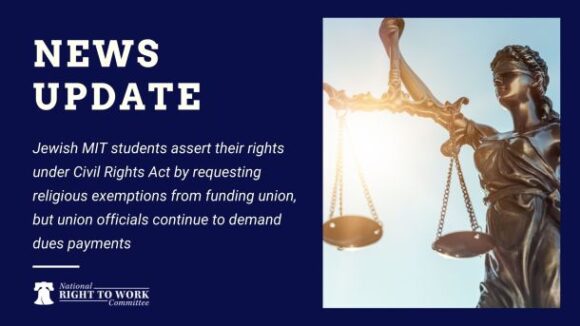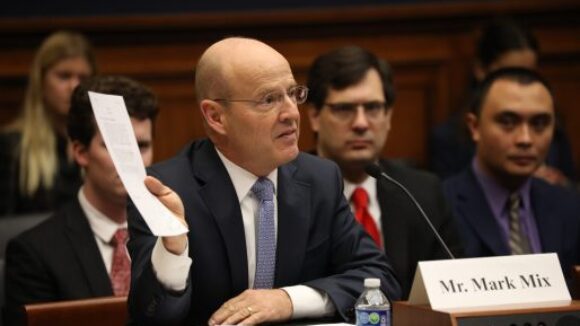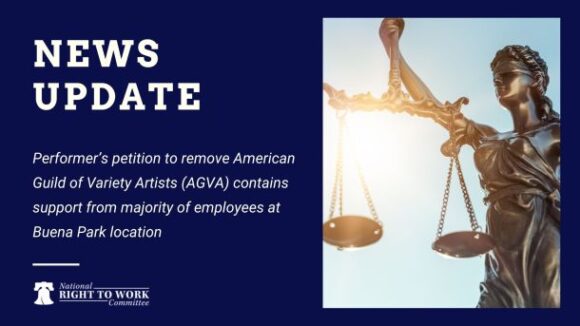Forced-Unionism Abuses Exposed – The facts Big Labor bosses would rather you didn’t hear about.
“[C]ompulsory unionism and corruption go hand in hand . . . .”
U.S. Sen. John McClellan (D-Ark.)
“Give us $1000, or you’ll be fired from your job.”
That sounds like an extortionate threat. And such threats are indeed often illegal. Under California law, for example, threatening to terminate an employee, even one hired on an “at will” basis, may “become unlawful when coupled with a demand for money,” as Justice Henry Needham explained in his opinion, issued May 6, in Galeotti v. IUOE Local 3 et al.
Unfortunately, today in California and 22 other states, coupling a “demand for money” from a private-sector employee with a threat of termination is in certain instances permitted AND explicitly authorized by law. Under the federal National Labor Relations Act (NLRA), union bosses and employers are actively encouraged to cut deals mandating that front-line employees either join and pay dues to a union, or fork over forced union fees. Those are the only two options for the individual employee who wants to keep his or her job, even if the employee never sought a union and never wanted one.
The NLRA provisions imposing forced union membership, dues and fees on American workers have been on the books (with certain modifications) for 85 years and remain in effect now in the 23 states — where roughly half of our private-sector workforce is employed — that still don’t have state Right to Work laws.
Big Labor-dominated California lacks Right to Work protections for employees.
Yet Needham and two other justices on a panel for the California Court of Appeal, First District, unanimously ruled this spring that three bosses of International Union of Operating Engineers (IUOE) Local 3, based in Alameda, Calif., may be tried for wrongful termination, extortion and racketeering in connection with the termination of employee John Galeotti for refusal to fork over $1,000 to them.
The reason Local 3 Business Manager Dan Reding, former Local 3 Business Manager Russell Burns, and Local 3 Financial Secretary Dave Harrison are in legal jeopardy now is that they allegedly shook down Galeotti and other union staffers for cash, illegally, at the same time they were shaking down rank-and-file IUOE-“represented” employees for cash, with the NLRA’s blessing.
As legal reporter Maeve Allsup explained in a May 7 article for Bloomberg Law, Galeotti charges that, for roughly a decade, Reding and Burns “required” union staff members to “donate to their re-election campaigns” on threat of termination. In 2009, 2012 and 2015, Reding and Burns ran unopposed and incurred no campaign expenses, but still kept all the money they had extracted from union staffers, according to Galeotti. Only in 2018, when Harrison joined the Reding-Burns ticket, was there a contested union election.
That year, Galeotti was told he would have to contribute $1,000 to the Reding-Burns-Harrison ticket, or be fired.
Not believing he could afford to do that, Galeotti contributed $500. In June 2018, he was fired, allegedly because he did not cough up the entire $1000 that had been demanded. Subsequently, he decided to sue the union and several of its officials.
Overturning a trial court decision, the Court of Appeal panel found that Galeotti had “adequately alleged,” in Allsup’s words, that his employment was terminated “in violation of the public policy underlying the extortion statutes,” and the fact that forced payments were squeezed out of union staffers again and again over the years “shows a pattern of racketeering.”
Most Americans would undoubtedly agree with Judge Needham and the rest of the appellate panel in Galeotti that it is contrary to public policy for a person who holds power over a worker’s job to demand that the worker hand over money in order to keep the job.
What is baffling to ordinary citizens is why it is impermissible for union kingpins like Dan Reding, Russell Burns, and Dave Harrison to force staff members to kick back a portion of their pay in order to keep their jobs, but permissible, in California and 22 other states, for them to do the same ugly thing to unionized employees of private businesses.
The fact is, there is no reasonable explanation.


